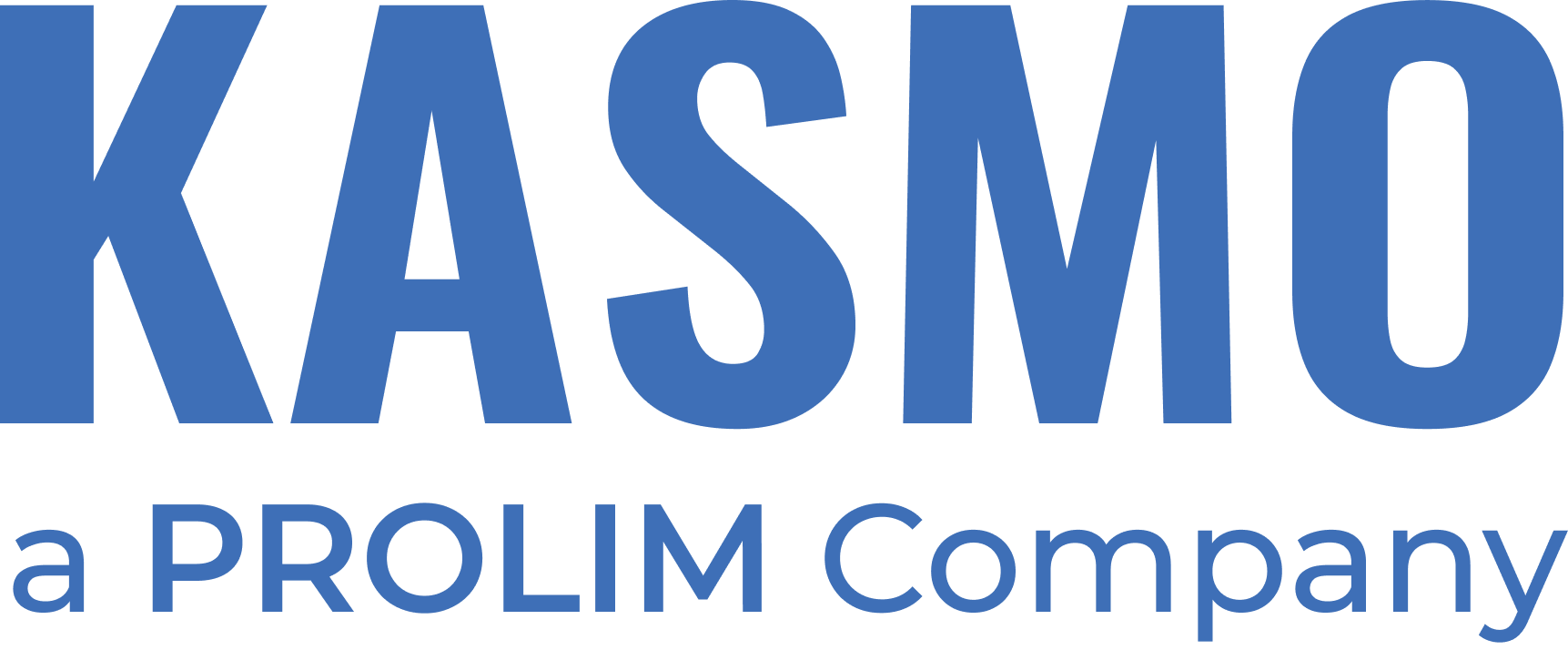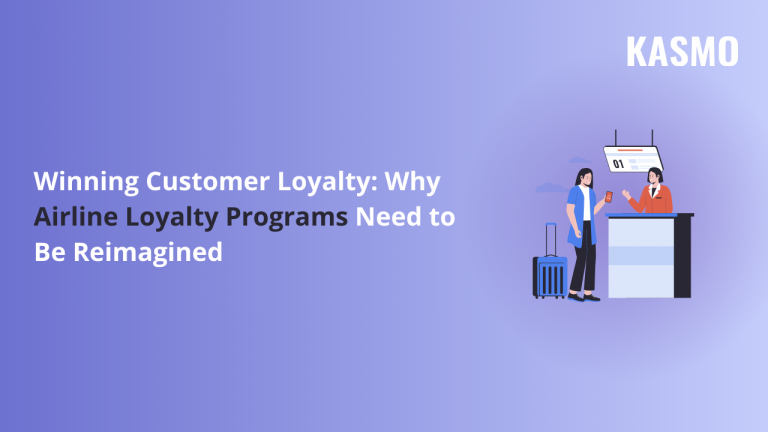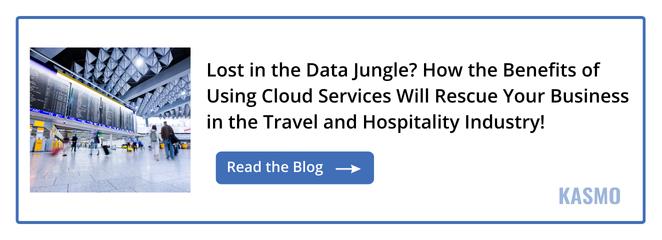Introduction
Customer retention is a critical factor in ensuring long-term success in the airline industry. By leveraging airline loyalty programs, companies can strengthen customer relationships and earn higher revenue. Airline companies can sell loyalty programs in bulk to banks, hotels, etc. However, as customer expectations increase and the industry faces new challenges, business leaders must rethink their loyalty strategies to stay relevant and competitive.
The airline industry gets an overwhelming amount of customer data on a regular basis. Business leaders need to understand how they can leverage the potential of this customer data to craft strategies for reinventing their loyalty programs.
By analyzing customer behavior and engagement patterns, airlines can gain valuable insights into what drives customers into selecting loyalty programs and how they can tailor their offerings accordingly. For instance, understanding a customer’s travel frequency, destination preferences, and spending habits can enable airlines to offer more relevant rewards and incentives.
Airline companies can also use this customer data to anticipate customer needs and proactively offer personalized experiences. For example, if an airline detects that a frequent traveler is experiencing a delay or long layover, it could offer a complementary hotel stay or other amenities to improve the travel experience. These types of personalization not only enhance customer satisfaction but also strengthen the relationship between the customer and the brand.
In this blog, we will explore how business leaders need to elevate their airline loyalty programs and why re-inventing loyalty programs can transform the future of the airline industry. We will also explore how Snowflake can help the airline industry create the best loyalty programs and enhance customer retention.
Importance of Loyalty Programs in the Airline Industry
Airline loyalty programs were originally designed to influence travelers’ behavior by offering rewards for frequent flying. These rewards included upgrades on airline seats and hotel stays. This encouraged customers to consolidate “points” or travel spendings with one airline, rather than switching between different airline companies.
However, airline companies started to tailor their loyalty programs solely on earning revenue, rather than focusing on how these programs will benefit customers. This reduced loyalty and travelers started to frequently change their airline companies. During the pandemic, the airline industry suffered a huge loss – both in terms of revenue as well as customers.
After the pandemic, there was a huge shift in customers’ demands. They now prefer digital and contactless services, rather than standing in long queues for booking airline tickets and check-in. According to a survey conducted by McKinsey in 2021 and 2023, revealed a steep decline in the likelihood that a customer would recommend airline, hotel, and cruise line loyalty programs to a friend or colleague.
Airline companies must think of creative ways to not only cater to these demands but also create different loyalty programs that can help them regain their customer base. If you are planning to re-invent your company’s loyalty programs, you need to think of strategies, amenities and benefits that you can provide to your customers which your competitors are not providing. By doing competitor analysis and taking feedback from customers, you can create the best loyalty programs for your customers.
Why Business Leaders Need to Elevate Their Airline Loyalty Programs
Here’s why airline companies need to re-think their loyalty programs:

Changing Consumer Expectations
The expectations of consumers have changed drastically in recent years. While frequent flyers were once the primary focus for airline companies, they are now focused on catering to a broader range of travelers, including travelers who very rarely spend time travelling. They are an untapped market which airline companies can explore and create new opportunities to increase their revenue.
In response to the shifting customer demands, business leaders must rethink their loyalty strategies to include both high-spending, frequent travelers and occasional travelers. One way to do this is by broadening the rewards structure and offering more flexible redemption options.
For example, rather than just offering reduced prices on flights, airlines can provide access to exclusive experiences, discounts on products and services and even partner with non-travel brands like credit card companies, banks and hotels to offer unique rewards that can attract a broader audience base.
The Need for Personalization
Today’s travelers expect personalized experiences that cater to their unique needs and preferences. Loyalty programs that rely on generic rewards and one-size-fits-all approaches are no longer generating desired results to airline companies. Airlines must leverage data and insights from their already existing loyalty programs and create new loyalty programs that help companies deliver targeted offers and benefits to individual customer interests and travel habits.
Additionally, personalization also goes beyond just offering tailored rewards. It also involves understanding when and how to offer these airline loyalty programs to customers. For example, an airline company could use customer data to notify travelers about upcoming trips, send personalized recommendations to hotels, or offer limited-time promotions and offers based on their booking history or upcoming travel plans. This type of engagement strengthens the relationship between the customer and the brand, fostering a sense of loyalty.
Increasing Competition
The travel industry is no longer the only sector offering loyalty programs. In recent years, industries such as banking, retails and hotels have also introduced their own loyalty programs that offer unique flexible and customer-centric rewards. For example, some banks offer separate credit and debit cards which customers can use solely on airline booking platforms and get discounts or rewards on ticket booking. They are also offering loyalty programs which allow them to utilize airport facilities at low cost.
Increasing competition in the industry requires companies to rebuild their airline loyalty programs to stay competitive. With new loyalty programs, business leaders can ensure they offer more than just airline-specific rewards. By partnering with other industries and expanding the range of redemption options, airlines can offer customers a more holistic and rewarding loyalty experience. This can include discounts ranging from shopping centers to access to entertainment areas at airports and wellness programs.
Building Long-Term Customer Relationships
The goal of any airline loyalty program is to build long-term relationships with customers, rather than simply incentivizing short-term relationships. Business leaders must focus on fostering genuine loyalty in customers by creating meaningful connections and making them feel valued.
This can be achieved by offering them exclusive benefits of becoming elite members, celebrating milestones such as offering them special discounts on birthdays and anniversaries, or providing surprise offers on achieving the highest number of reward points. These measures help airline companies exceed customer expectations. By creating the best airline loyalty programs, you are also creating memorable experiences for your customers.
How Can Loyalty Programs Solve the Challenges in the Airline Industry?
Airline loyalty programs still remain key tools for companies to navigate customer service challenges. Since they spend a major part of their budget on airline companies, customers expect tailored and personalized offers, recommendations and services at every step of their journey.
Loyalty programs can solve major challenges for the airline industry and help them stand apart from their competitors. By leveraging customer data, feedback and analyzing customer behavior and patterns, airlines can understand how they can craft their strategies for loyalty programs.
Here’s how airline companies can elevate their loyalty programs:

Offer Tiered Rewards and Benefits
Airline loyalty programs can cater to both customers who are frequently travelling and also to customers who are rarely travelling. By offering tiered reward programs that allow members to earn more benefits as they reach higher levels of loyalty, airline companies can keep their customers hooked into choosing only their aircraft for travelling.
This type of loyalty program encourages customers to use the airline company frequently for travel, increasing trust and enhancing brand reputation. For example, airlines can offer different levels of membership based on travel frequency, with each tier unlocking additional benefits such as free upgrades, priority boarding, and access to exclusive events. This tiered approach ensures that all customers, regardless of their travel frequency, feel valued and motivated to continue engaging with the program.
Expand Partnerships and Redemption Options
To spread the word more about their loyalty programs, airlines should consider expanding their partnerships with other businesses and industries. For example, airline companies could partner with hotels, car rental companies, and financial services firms to offer members a wider range of redemption options.
Additionally, airlines could facilitate customers to redeem points for non-travel-related rewards, such as gift cards, merchandise, or charitable donations. By offering a broader array of redemption choices, airlines can ensure that their loyalty programs remain relevant to a diverse customer base.
Leverage Data and AI to Enhance Personalization
Data and AI plays a crucial role in the success of airline loyalty programs. By leveraging data, advanced AI and machine learning models, airlines can deliver personalized recommendations, promotions, and offers to their customers. For example: airline companies can send personalized emails, targeted mobile notifications, and tailored advertisements to their customers, increasing customer engagement and loyalty.
How Snowflake AI Data Cloud Can Elevate Airline Loyalty Programs?
Snowflake – the leading AI Data Cloud platform, enables airline companies to get a 360-degree view of their customers by empowering them to consolidate different types of data from disparate sources on a single platform. This comprehensive overview of customer data helps airline companies reimagine their loyalty programs.
By combining data from various sources, airlines can gain deeper insights into customer behaviors and preferences, and tailor their offerings accordingly. Here’s how airline companies can enhance their loyalty programs by leveraging Snowflake:

Provides Personalized Offers and Timely Promotions
Airlines can use Snowflake AI Data Cloud platform to create personalized offers based on customer data. By utilizing large language models (LLMs) and machine learning (ML) models, airlines can customize promotions, offers, and tailor communication (like booking confirmations or travel status updates). This personalization increases customer engagement and satisfaction, making loyalty programs more effective.
Facilitates Seamless Data Collaboration and Partner Integration
Snowflake empowers airlines to easily partner with hotels, car rental agencies, and cruise companies. This collaboration helps airline companies create more cohesive loyalty programs, offering customers rewards across multiple touchpoints. By sharing data securely with partners, airlines can create joint loyalty programs that enhance customer retention and engagement.
Enables Predictive Analytics for Loyalty Program Optimization
Using predictive analytics, airlines can anticipate customer needs and preferences, ensuring that loyalty programs evolve with changing customer behaviors. By forecasting travel trends, spending patterns, and tracking engagement metrics, airlines can fine-tune their loyalty programs, ensuring they remain relevant and appealing to their customers.
Improves Customer Experience
By leveraging Snowflake, airline companies can deliver faster and more personalized customer interactions, improving customer engagement. This results in better customer satisfaction and a higher likelihood of customers participating in and benefiting from loyalty programs. Snowflake’s ability to integrate AI and machine learning models allows airlines to offer more seamless and delightful experiences, further strengthening loyalty.
Why Choose Kasmo?
Kasmo – a proud Premier Partner of Snowflake, leverages the modern data cloud platform to help airline companies enhance their decision-making process. Airline companies can leverage Kasmo’s Prebuilt BI Solution Accelerator and seamlessly unlock valuable insights from their data.
Here’s how airline companies can benefit from Kasmo’s Prebuilt BI Solution Accelerator:

Streamlining Data Integration
Kasmo’s BI Solution Accelerator integrates data from a variety of sources, including passengers, tickets, flights and payments. This solution ingests the data into Snowflake using prebuilt ETL pipelines, ensuring smooth and reliable data flow. This centralized data repository enables airlines to easily access and analyze, empowering them with actionable insights.
Interactive Dashboards for Actionable Insights
The Prebuilt BI Solution Accelerator offers interactive dashboards that provide valuable insights into airline performance. Airlines can track revenue, analyze performance across different regions and flight routes, and gain a 360-degree view of travelers’ behavior, loyalty programs, and more.
Faster Decision-Making
By using Kasmo’s BI Solution Accelerator, airlines can significantly reduce the time required to gather and analyze data. The solution’s intuitive dashboards and prebuilt analytics models help airlines make faster, data-driven decisions, enhancing their ability to respond to market changes and improve customer satisfaction.




